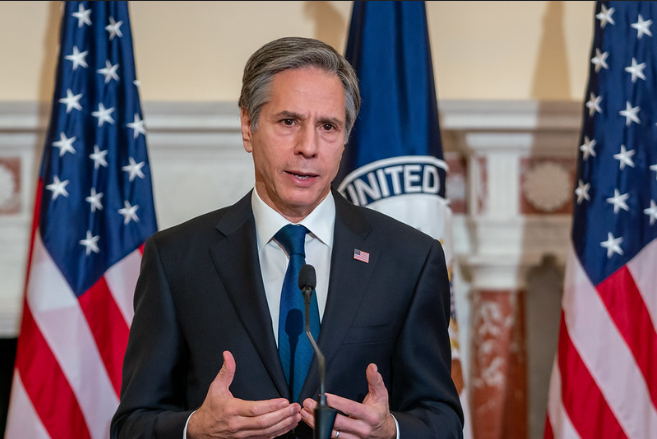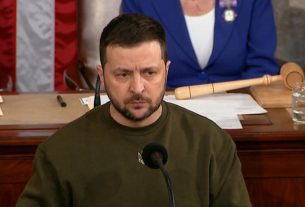The Biden administration has announced its intention to support a new Syrian government that renounces terrorism, dismantles chemical weapon stockpiles, and upholds the rights of women and minorities. The announcement comes as Syria faces a tumultuous political shift, following the recent collapse of President Bashar Assad’s government.
In a statement on Tuesday, Secretary of State Antony Blinken affirmed that the U.S. would back a future Syria that meets these conditions, though he stopped short of naming specific groups the U.S. would work with in the transitional process. The U.S. has not ruled out potential talks with the main Syrian rebel group, Hayat Tahrir al-Sham (HTS), despite its designation by the U.S. as a terrorist organization since 2018.
U.S. Stance on Syria’s Political Transition
The United States’ stance on Syria has been marked by cautious optimism as Assad’s regime faced a significant blow during a series of rapid military advances by HTS, which effectively overthrew the government in recent days. In his statement, Blinken emphasized that the U.S. would support efforts to ensure that Syria’s future government is inclusive and respectful of human rights. The U.S. has pledged to assist in this transition, aligning itself with regional partners to ensure a stable political outcome.
However, Blinken’s comments have raised questions about the potential role of HTS, given its designation as a terrorist organization. Although the U.S. maintains a hardline stance against terrorism, it has expressed a willingness to reevaluate HTS’s status, should the group take meaningful steps to distance itself from violent extremism.
Military Operations and ISIS
In the backdrop of Syria’s political upheaval, the U.S. military continues to focus on countering the Islamic State (ISIS) threat. The U.S. recently launched a large-scale operation in the Syrian desert aimed at preventing ISIS from regaining territory and reorganizing as a global threat. Approximately 900 U.S. troops are stationed in Syria, working with Kurdish-led forces in the Syrian Democratic Forces (SDF) to combat ISIS remnants.
At the same time, U.S. efforts to maintain stability in Syria are complicated by Israeli actions in the region. The U.S. has expressed support for Israel’s recent military operations in Syria, which include strikes against military and alleged chemical weapons facilities following the fall of Assad’s government. The White House reaffirmed its commitment to Israel’s security, calling the strikes “exigent operations” to eliminate perceived threats.
Tensions in the Golan Heights
Amid these developments, the situation in the Golan Heights remains a key point of tension. Israel’s recent military actions in the Golan, a strategically important region that Syria has long claimed, have raised concerns across the Middle East. Israeli Prime Minister Benjamin Netanyahu announced that Israel would temporarily control a demilitarized buffer zone in the Golan Heights, citing the collapse of the 1974 disengagement agreement between Israel and Syria. This move has been met with condemnation from several regional actors, including Turkey, Saudi Arabia, Egypt, and Qatar.
The U.S. has historically supported Israel’s actions in the Golan Heights, and under the Trump administration, it became the first country to recognize Israel’s sovereignty over the region. However, with the current instability in Syria, the Biden administration has expressed cautious support for Israel’s military actions while maintaining a neutral stance on the issue of sovereignty.
International Reactions and U.S. Diplomacy
The rapidly shifting dynamics in Syria are being closely monitored by the international community. U.S. officials, including National Security Adviser Jake Sullivan, are set to meet with Israeli officials to discuss the situation in Syria and broader efforts to achieve a ceasefire in Gaza.
In addition, the U.S. continues to engage with regional players to assess the evolving situation. The outcome of the political transition in Syria remains uncertain, and much depends on whether the new leadership can meet U.S. criteria, especially regarding the protection of women’s rights and the dismantling of weapons of mass destruction.
Conclusion
The Biden administration’s cautious support for a post-Assad Syria marks a significant shift in U.S. policy, one that prioritizes human rights and stability. While it remains to be seen how the political situation in Syria will unfold, U.S. efforts to prevent the resurgence of ISIS and address regional security concerns will play a key role in shaping the future of the country. The ongoing dialogue with international and regional partners underscores the complexity of the situation and the U.S.’s commitment to supporting a more peaceful and inclusive Syria.



